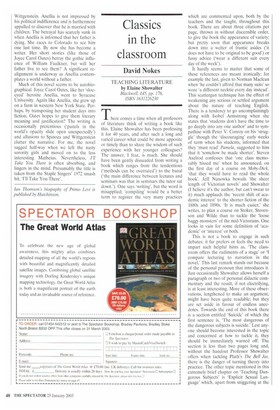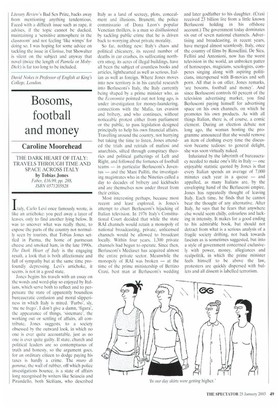Classics in the classroom
David Nokes
TEACHING LITERATURE by Elaine Showalter Blackwell, 145, pp. 176, ISBN 1631226230 There comes a time when all professors of literature think of writing a book like this. Elaine Showalter has been professing it for 40 years, and after such a long and varied career what could be more apposite or timely than to share the wisdom of such experience with her younger colleagues? The answer, I fear, is much. She should have been gently dissuaded from writing a book which ranges from the tendentious (methods can be overrated') to the banal (the main difference between lectures and seminars was that in seminars the tutor sat down.'). One says 'writing', but the word is misapplied; 'compiling' would be a better term to register the very many practices which are commented upon, both by the teachers and the taught, throughout this book. There are about three citations per page, thrown in without discernible order, to give the book the appearance of variety; but pretty soon that appearance breaks down into a welter of frantic asides (it does not have to be original to be good') or fussy advice ('wear a different suit every day of the week').
It hardly seems to matter that some of these references are meant ironically; for example the last, given to Norman Maclean when 'he couldn't afford that many suits' so wore 'a different necktie every day instead'. This scattergun technique has the effect of weakening any serious or settled argument about the nature of teaching English. There is a tendency to go uncomplainingly along with Isobel Armstrong when she states that 'students don't have the time to go deeply into any one author' and to sympathise with Peter V. Conroy on his 'struggle' though the 'discouraging' early weeks of term when his students, informed that they 'must read' Pamela, suggested to him that it 'somehow be made shorter'. Steven Axelrod confesses that 'one class memorably hissed me' when he announced, on the first day of a course on Moby-Dick, 'that they would have to read the whole book'. Jeff Nunowka bewails 'the sheer length of Victorian novels' and Showalter (I believe it's the author, but can't swear to it) much applauds the 'recent shift of academic interest' to the shorter fiction of the 1880s and 1890s, 'It is much easier,' she writes, to plan a course on Stoker, Stevenson and Wilde than to tackle the 'loose baggy monsters' of the mid-Victorians. One looks in vain for some definition of 'academic' or 'interest' or both.
This is not a book to engage in such debates; it far prefers or feels the need to impart such helpful hints as, 'The classroom offers the rudiments of a stage' or 'I compare lecturing to narration in the novel.' This last remark stands out because of the personal pronoun that introduces it. Just occasionally Showalter allows herself a paragraph or two of personal didactic commentary and the result, if not electrifying, is at least interesting. More of these observations, lengthened to make an argument, might have been quite readable; but they are set aside in favour of endless anecdotes. Towards the end of this book there is a section entitled 'Suicide' of which the first sentence is, 'The most dangerous of the dangerous subjects is suicide.' Lest anyone should become interested in the topic and concerned at how to tackle it, they should be immediately warned off. The section is less than two pages long and, without the handout Professor Showalter offers when tackling Plath's The Bell Jar, there is the danger of turning theory into practice. The other topic mentioned in this extremely brief chapter on 'Teaching Dangerous Subjects' is 'Explicit Sexual Language' which, apart from sniggering at the Literary Review's Bad Sex Prize, backs away from mentioning anything tendentious, Faced with a difficult issue such as rape, it advises, if the topic cannot be ducked, maintaining a 'sensitive atmosphere in the classroom' and not feeling 'like wimps' for doing so. I was hoping for some advice on tackling the issue in Clarissa, but Showalter is silent on the subject and anyway that novel (twice the length of Pamela or MobyDick) is far too long to be included.
David Nokes is Professor of English at King's College, London.



















































































 Previous page
Previous page